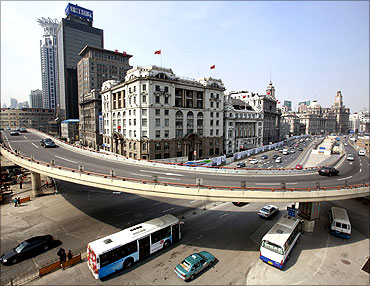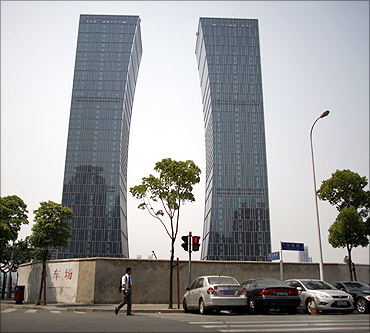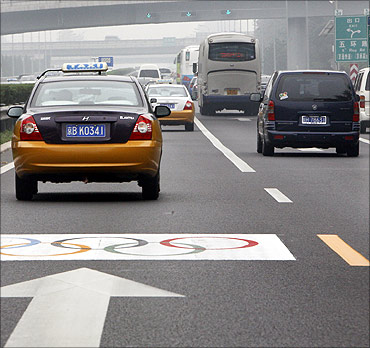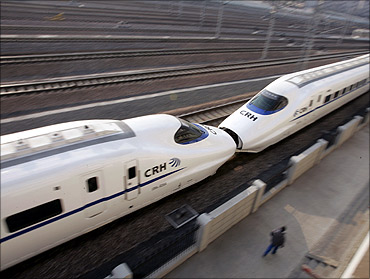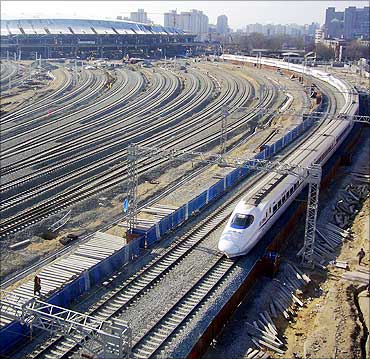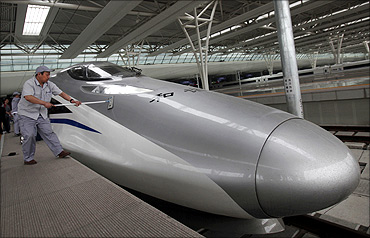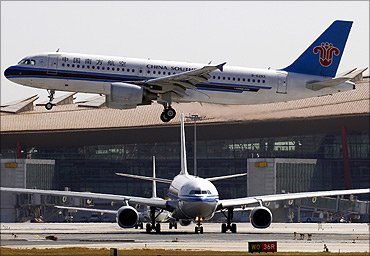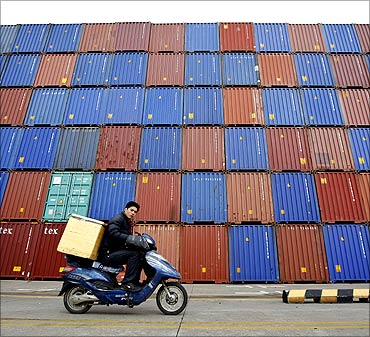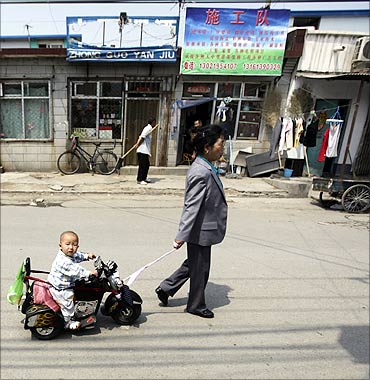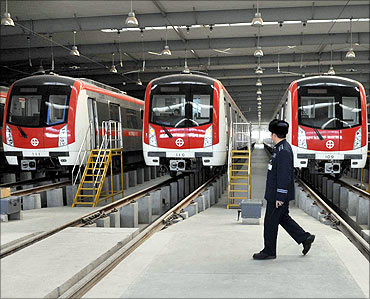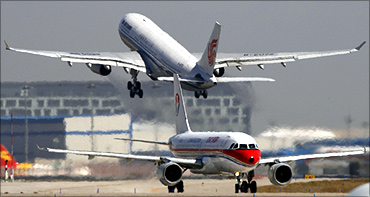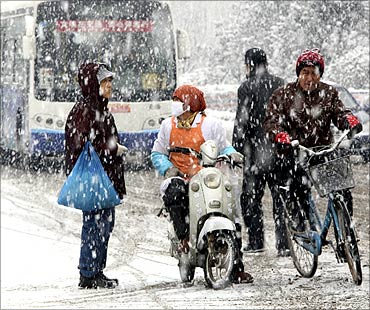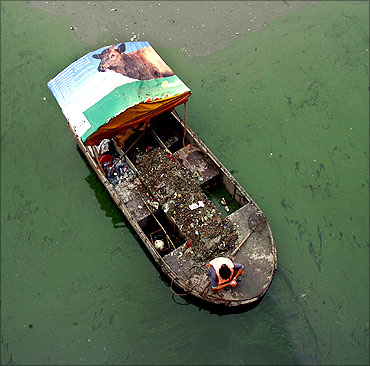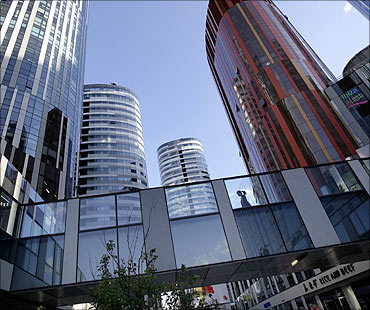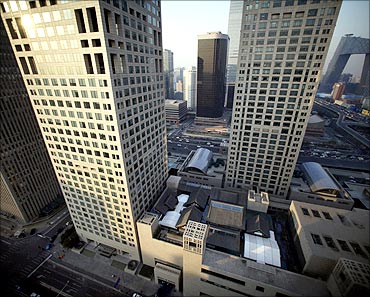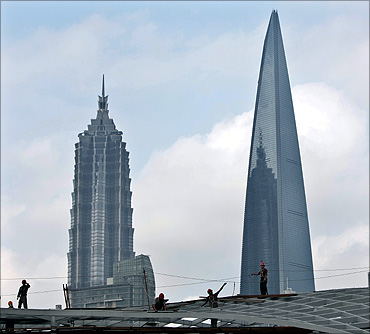20 interesting facts on China's infrastructure
Last updated on: June 2, 2011 14:21 IST
"If you want to be rich, you must first build roads," says a Chinese proverb.
The Chinese firmly believe that massive investment in infrastructure will help it keep pace with the developed nations.
So China spends about 40-50 per cent of its GDP on infrastructure -- roads, bridges, trains, ports, technology, factories and office buildings in a bid to establish itself as a global economic superpower.
The world's fastest-growing economy has seen average growth rates of 10 per cent for the past three decades.
Click NEXT to read 20 interesting facts on China's infrastructure...
20 interesting facts on China's infrastructure
Last updated on: June 2, 2011 14:21 IST
China is planning to spend $950 billion on roads, bridges and ports from 2011 to 2015. An express rail line will be built to connect Hong Kong.
Click NEXT to read on . . .
20 interesting facts on China's infrastructure
Last updated on: June 2, 2011 14:21 IST
China's investment on transportation infrastructure stood at $11.8 billion in 2010. However, China's roads and railways have not expanded meet the growing needs of a rising population.
Click NEXT to read on . . .
20 interesting facts on China's infrastructure
Last updated on: June 2, 2011 14:21 IST
Over the next five years, China will invest heavily in expanding urban infrastructure to meet the growing demands of the people. An ambitious plan to merge nine cities around the Pearl River Delta is also being worked out.
Click NEXT to read on . . .
20 interesting facts on China's infrastructure
Last updated on: June 2, 2011 14:21 IST
China has the second longest expressway network in the world after the United States. The 'National Trunk Highway System' has expanded the network to cover more than 74,000 km by the end of 2010.
Click NEXT to read on . . .
20 interesting facts on China's infrastructure
Last updated on: June 2, 2011 14:21 IST
China has the world's second largest rail network with a total track length of 91,000 km. Last year, 5,000 km of track were added, 40 per cent of which is electrified.
Click NEXT to read on . . .
20 interesting facts on China's infrastructure
Last updated on: June 2, 2011 14:21 IST
According to the Asian major's 12th Five-Year Plan (2011-2015), the high-speed railway network will stretch to 45,000 km. China's high-speed railway extended to 649 km in 2008. In three years, it has increased to 8,400 km.
Click NEXT to read on
20 interesting facts on China's infrastructure
Last updated on: June 2, 2011 14:21 IST
In October 2010, China unveiled the world's fastest bullet train. The CRH380 bullet train, made in China connects Shanghai and Hangzhou. It travels 200 kilometres in just 45 minutes.
Click NEXT to read on
20 interesting facts on China's infrastructure
Last updated on: June 2, 2011 14:21 IST
China has the world's first commercial high-speed maglev (magnetic levitation) train service). Built in collaboration with Germany, the 38-km long route between downtown Shanghai and the Pudong airport opened in 2003. The project cost $1.2 billion.
Click NEXT to read on . . .
20 interesting facts on China's infrastructure
Last updated on: June 2, 2011 14:21 IST
By 2014, China will have about 19,000 km of high-speed railway, ten times more than Japan's high-speed rail network.
Click NEXT to read on
20 interesting facts on China's infrastructure
Last updated on: June 2, 2011 14:21 IST
China is planning to build 97 new airports in 12 years, including a second international airport in Beijing. By 2020, China is likely to have 244 airports.
Click NEXT to read on
20 interesting facts on China's infrastructure
Last updated on: June 2, 2011 14:21 IST
China has more than 2,000 ports. China has sixteen major shipping ports with a capacity of over 50 million tons per year.
Click NEXT to read on
20 interesting facts on China's infrastructure
Last updated on: June 2, 2011 14:21 IST
As per the 12th Five-Year Plan, the Chinese government will focus on infrastructure development in on rural areas to bridge the divide between the urban and rural areas.
Click NEXT to read on
20 interesting facts on China's infrastructure
Last updated on: June 2, 2011 14:21 IST
Currently, there are 12 rapid transit systems in mainland China. Sixteen new systems are under construction and 18 more metros are planned. China will have 170 new mass-transit systems by 2025.
Click NEXT to read on
20 interesting facts on China's infrastructure
Last updated on: June 2, 2011 14:21 IST
China will become the world's second largest airliner market by 2030. It would need 4,330 new commercial airplanes valued at $480 billion in the next twenty years.
Click NEXT to read on
20 interesting facts on China's infrastructure
Last updated on: June 2, 2011 14:21 IST
China is now the world's largest automobile producer and consumer. In 2010, China beat the US as the world's largest auto market.
Click NEXT to read on
20 interesting facts on China's infrastructure
Last updated on: June 2, 2011 14:21 IST
China has also surpassed Japan as the world's top automaker and Germany as the world's largest auto exporter.
China will account for the largest number of vehicles sold in any country in 2011 and 2012.
Click NEXT to read on
20 interesting facts on China's infrastructure
Last updated on: June 2, 2011 14:21 IST
China has 110,000 kilometres of navigable rivers, streams, lakes, and canals. China has a number of amazing bridges.
The world's longest trans-oceanic bridge extends across the Hangzhou Bay to over 35.673 kilometres (22 miles). It has six expressway lanes in two directions.
Click NEXT to read on
20 interesting facts on China's infrastructure
Last updated on: June 2, 2011 14:21 IST
Five million new buildings will come up in China by 2025, out of which 50,000 will be skyscrapers.
Click NEXT to read on
20 interesting facts on China's infrastructure
Last updated on: June 2, 2011 14:21 IST
China could build a city as big as 'Chicago' every year until 2030. The country already has more than 1,500 new 30-storeyed buildings.
Click NEXT to read on
20 interesting facts on China's infrastructure
Last updated on: June 2, 2011 14:21 IST
Six of the 15 tallest completed buildings in the world are in China.


